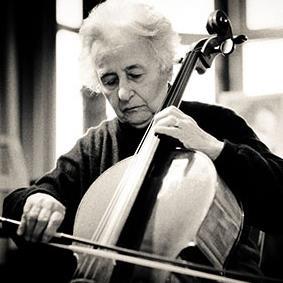Words by Amélie Bodnar-Tunnell
Anita Lasker-Wallfisch was the youngest daughter born into a Jewish family in Breslau, Germany – now Wroclaw, Poland – in July 1925. Her father was a lawyer and her mother a talented violinist, and Anita began learning the cello as a child and was even sent to Berlin to study with Leo Rostal. In her book, Inherit the Truth, Anita talks about her childhood in Breslau and how as children, she and her sisters all learnt instruments. Together they formed a trio and Anita was occasionally allowed to join the weekly quartet sessions that were held at her home.
At the age of just 16 and 17, Anita and her older sister Renate were arrested by the Gestapo and imprisoned for over a year before being sent separately to Auschwitz, later being transferred to Bergen-Belsen. In her book, Anita recalls after her arrival being processed into Auschwitz by another girl, and how in mentioning that she had previously played the cello, she was told “You will be saved”.
After having to audition, Anita then became part of the Women’s Orchestra of Auschwitz. She was the only cellist in the orchestra, and prior to Anita’s arrival there had not been a single bass instrument. Anita developed very close friendships with the women in the orchestra, many of whom she stayed in contact with after their liberation. The Orchestra was led by Alma Rosé, daughter of the famous violinist Arnold Rosé, who Anita describes as “a most remarkable woman”. Being part of the orchestra provided a layer of protection, especially for Anita – as the only cellist she was irreplaceable, allowing Anita to find and request a job role for her sister. Her cello playing saved both her and her sister’s lives.
The Women’s Orchestra played at the main gate in Auschwitz twice a day to keep the prisoners marching in time. As Anita recalls, “It was imperative that these columns of prisoners should march neatly and in step, and we provided the music to achieve this.” In addition to this, the orchestra also ‘gave concerts’ on most Sundays, and had to be prepared to play for any SS personnel who went to the music block expecting entertainment. Their rehearsals were run by Alma Rosé, who set the highest standards; as Anita explains “Alma had to drill practically everybody note by note, and she threw herself into the task with a fervour that seemed ridiculous in the circumstances. We must not forget that outside our little world the gas chambers were working non-stop.”
Anita’s book is an incredible memoir recounting the incidents that she and her sister experienced at such a young age. She explains that the book was a development from when she “eventually compiled a ‘book’ for [her] children so that they could ‘inherit the truth’ and keep alive the memory of those terrible days.” She explains in the introduction that the book was not written as an account of the horrors or as a historical document; instead, it was simply a way for Anita to write about how her life had been affected by living in Germany as a Jewish person.
After the liberation of Belsen on the 15th of April 1945, both Anita and Renate became official interpreters attached to the British Army. It unfortunately took 11 months for them to emigrate to England, but during this time, after consistent requests and the help of a senior officer, Anita received a cello and was able to take up playing once again; she was also called as a witness for the trial of Belsen that took place in Lüneburg.
Both Anita and Renate were finally able to travel across to England on the 18th of March 1946. Anita went on to study at Guildhall School of Music and eventually became a founding member of the English Chamber Orchestra. It wasn’t until 1994 that Anita revisited Germany for the first time whilst touring with the English Chamber Orchestra. Anita only began talking about her life and experiences during the holocaust after her Grandchildren were born. Although when first arriving in England, both Renate and Anita “badly wanted to talk, but no one asked any questions.”, Anita explains that she never had an overwhelming desire to talk about her experiences. Despite this, Anita states that the lack of discussion at times surrounding the holocaust does not primarily come from survivors not wanting to talk about their experiences, but rather a lack of questions being asked, and people wanting to protect themselves from too much knowledge.
In having spoken to a former colleague of Anita’s, aside from her talent as a cellist, her overriding quality appears to be her sense of humour. She is remembered as having a cheeky sense of humour and being a slight prankster at times, as well as being someone who did not suffer fools gladly. Although she was sometimes seen as formidable, this younger colleague remembers her as being incredibly caring. She is a very good section player and was always seen to be incredibly grateful for music.
Overall, Anita has had a very successful career as a cellist and has done incredible work in recounting her experience in the Women’s Orchestra of Auschwitz through many interviews over the years. She was awarded the MBE in the 2016 Queen’s Birthday Honours List for her services to Holocaust Education in London, as well as both her and her sister being awarded a medal by the French Government after the war.
I would like to finish by recognising that not only can we never fully understand or comprehend the true extent of the horrors that went on during the holocaust, but that it is also incredibly difficult for those speaking on their experiences to fully convey what it was like. Finally, I believe it is incredible to see that not only is music indestructible, but it has the ability to save lives.
Photo Credits: Benjamin Ealovega

